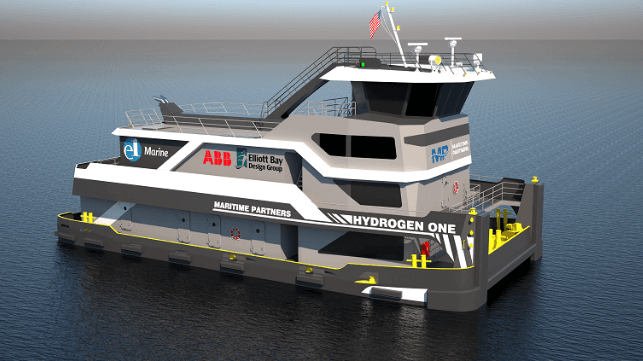Leading Towboat Owner Plans to Buy a Fuel Cell-Powered Prototype

Maritime Partners, a leading vessel owner and financier in the inland towing sector, is planning to order a prototype methanol-fueled, fuel-cell-powered towboat for delivery in 2023.
The boat will be built to a novel design developed by the naval architects at Elliott Bay Design Group (EBDG), in partnership with system integrator ABB and methanol-to-hydrogen supplier E1 Marine. The combination of methanol fuel, E1's methanol reformer (which strips out the methanol's hydrogen) and a hydrogen fuel cell gives it a significant edge over battery-powered systems for sheer range. The system delivers about 550 miles of transit distance - enough for about four days of travel - for a typical towboat running at normal speeds.
EBDG thinks that this combination may be the only commercially-available option for decarbonizing a towboat for long-haul operations. Finding a new power source for the towboat sector is difficult, since towboats have limits for size and displacement in order to fit under bridges and navigate shallow rivers. Batteries only work on fixed routes, with daily time and access for charging, and a towboat’s limited storage capacity restricts the use of pressurized or cryogenic gases as fuels. There are also very few dockside facilities that can bunker a towboat with these more technically-demanding fuels, and as a practical matter, this would limit a vessel’s range and functionality. By contrast, methanol is a ubiquitous industrial chemical and a familiar cargo for the inland towboat industry.
"The US towboat market is one of the most traditional in the world, so it's important to recognise what this represents: the first step in a shift from diesel electric to methanol electric, and a major advancement towards zero emissions," said David Lee of ABB Marine & Ports.
Virtually all methanol on the market today is derived from natural gas, and while its use does result in carbon emissions, the higher efficiency of a fuel cell means that operating the new system would result in a lower carbon footprint than operating a conventional diesel engine. According to E1, while running on standard methanol the hydrogen generator / fuel cell set produces zero particulates, zero NOX, zero SOX, and 28 percent less CO2 than a diesel generator. If the operator switches to "green" methanol produced from a source of green hydrogen - when and if it becomes available - this carbon footprint could be further reduced without altering the equipment on board.
“Shipowners have been understandably reluctant to commit to low carbon fuels until the infrastructure is available to refuel their vessels. The M/V Hydrogen One solves that problem by using methanol, which is safe and readily available worldwide," said Austin Sperry, the co-founder and COO at Maritime Partners.
